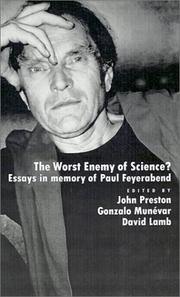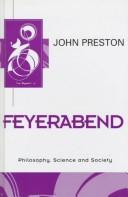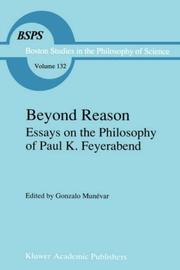| Listing 1 - 10 of 16 | << page >> |
Sort by
|

ISBN: 1280530499 0195351711 1429403853 9781429403856 9781280530494 9780195351712 9786610530496 6610530491 0195128745 9780195128741 0197731996 Year: 2023 Publisher: New York ; Oxford University Press,
Abstract | Keywords | Export | Availability | Bookmark
 Loading...
Loading...Choose an application
- Reference Manager
- EndNote
- RefWorks (Direct export to RefWorks)
Paul Feyerabend's radical epistemological claims, and his argument that there is no such thing as scientific method, were influential during his life and have gained in attention since his death in 1994. These essays cover the diverse themes in his extensive body of work.
Philosophy, German --- Feyerabend, Paul, --- Feyerabend, P. K. --- Feyerabend, Paul Karl

ISBN: 0745616763 9780745616766 Year: 1997 Publisher: Cambridge Polity press
Abstract | Keywords | Export | Availability | Bookmark
 Loading...
Loading...Choose an application
- Reference Manager
- EndNote
- RefWorks (Direct export to RefWorks)
Philosophy of science --- Feyerabend, Paul --- Feyerabend, Paul, --- Feyerabend, P. K. --- Feyerabend, Paul Karl --- Feyerabend, Paul, - 1924-1994

ISBN: 0195128745 9780195128741 Year: 2000 Publisher: New York (N.Y.): Oxford university press
Abstract | Keywords | Export | Availability | Bookmark
 Loading...
Loading...Choose an application
- Reference Manager
- EndNote
- RefWorks (Direct export to RefWorks)
Feyerabend, Paul, --- Feyerabend, Paul K. --- Feyerabend, P. K. --- Feyerabend, Paul Karl --- Feyerabend, Paul --- Feyerabend, Paul, - 1924-1994
Book
ISBN: 8834306422 Year: 1992 Publisher: Milano Vita e pensiero
Abstract | Keywords | Export | Availability | Bookmark
 Loading...
Loading...Choose an application
- Reference Manager
- EndNote
- RefWorks (Direct export to RefWorks)
Book
ISBN: 1108624790 1108575102 1108620531 9781108575102 9781108471992 9781108458917 1108458912 1108471994 Year: 2021 Publisher: Cambridge : Cambridge University Press,
Abstract | Keywords | Export | Availability | Bookmark
 Loading...
Loading...Choose an application
- Reference Manager
- EndNote
- RefWorks (Direct export to RefWorks)
This collection of new essays interprets and critically evaluates the philosophy of Paul Feyerabend. It offers innovative historical scholarship on Feyerabend's take on topics such as realism, empiricism, mimesis, voluntarism, pluralism, materialism, and the mind-body problem, as well as certain debates in the philosophy of physics. It also considers the ways in which Feyerabend's thought can contribute to contemporary debates in science and public policy, including questions about the nature of scientific methodology, the role of science in society, citizen science, scientism, and the role of expertise in public policy. The volume will provide readers with a comprehensive overview of the topics which Feyerabend engaged with throughout his career, showing both the breadth and the depth of his thought.
Philosophy, Austrian --- Philosophers --- Social sciences --- Science --- Philosophy, Modern --- Philosophy --- History --- Feyerabend, Paul, --- Feyerabend, P. K. --- Feyerabend, Paul Karl --- Feyerabend, Paul - 1924-1994
Book
ISBN: 3319065874 3319065866 Year: 2014 Publisher: Cham : Springer International Publishing : Imprint: Springer,
Abstract | Keywords | Export | Availability | Bookmark
 Loading...
Loading...Choose an application
- Reference Manager
- EndNote
- RefWorks (Direct export to RefWorks)
This volume examines Popper’s philosophy by analyzing the criticism of his most popular critics: Thomas Kuhn, Paul Feyerabend and Imre Lakatos. They all followed his rejection of the traditional view of science as inductive. Starting from the assumption that Hume’s criticism of induction is valid, the book explores the central criticism and objections that these three critics have raised. Their objections have met with great success, are significant and deserve paraphrase. One also may consider them reasonable protests against Popper’s high standards rather than fundamental criticisms of his philosophy. The book starts out with a preliminary discussion of some central background material and essentials of Popper’s philosophy. It ends with nutshell representations of the philosophies of Popper. Kuhn, Feyerabend and Lakatos. The middle section of the book presents the connection between these philosophers and explains what their central ideas consists of, what the critical arguments are, how they presented them, and how valid they are. In the process, the author claims that Popper's popular critics used against him arguments that he had invented (and answered) without saying so. They differ from him mainly in that they demanded of all criticism that it should be constructive: do not stop believing a refuted theory unless there is a better alternative to it. Popper hardly ever discussed belief, delegating its study to psychology proper; he usually discussed only objective knowledge, knowledge that is public and thus open to public scrutiny.
Popper, Karl R. --- Feyerabend, Paul, --- Criticism and interpretation. --- Feyerabend, P. K. --- Feyerabend, Paul Karl --- Popper, Karl Raimund --- Popper, K.R. --- Philosophy (General). --- Science --- Philosophy, general. --- Philosophy of Science. --- Philosophy. --- Normal science --- Philosophy of science --- Philosophy and science. --- Science and philosophy --- Mental philosophy --- Humanities

ISBN: 0226245314 9780226245317 Year: 1995 Publisher: Chicago (Ill.): University of Chicago press
Abstract | Keywords | Export | Availability | Bookmark
 Loading...
Loading...Choose an application
- Reference Manager
- EndNote
- RefWorks (Direct export to RefWorks)
Philosophers --- Intellectuals --- Science --- Biography. --- Philosophy --- History --- -Philosophers --- -Science --- -Natural science --- Science of science --- Sciences --- Scholars --- Intelligentsia --- Persons --- Social classes --- Specialists --- Biography --- -History --- -Feyerabend, Paul K. --- -Biography --- Feyerabend, Paul, --- Feyerabend, P. K. --- Feyerabend, Paul Karl --- Feyerabend, Paul --- 20th century --- Feyerabend, Paul K. --- Feyerabend, Paul K., - 1924 --- -Philosophers - Biography. --- Philosophers - Biography --- Intellectuals - Biography --- Science - Philosophy - History - 20th century.

ISSN: 03448142 ISBN: 9783110189070 3110189070 311089176X 9783110891768 Year: 2006 Volume: Bd. 73 Publisher: Berlin de Gruyter
Abstract | Keywords | Export | Availability | Bookmark
 Loading...
Loading...Choose an application
- Reference Manager
- EndNote
- RefWorks (Direct export to RefWorks)
Paul Feyerabend ranks among the most exciting and influential philosophers of science of the twentieth century. This reconstruction of his developing ideas combines historical and systematic considerations. Part I examines the three main influences on Feyerabend's philosophical development: Wittgenstein's later philosophy, Popper critical rationalism and Ehrenhaft's experimental effects. Part II focuses on Feyerabend's development and use of the notion of incommensurability at the heart of his philosophical critiques, and investigates his relation to realism. Feyerabend initially developed the notion of incommensurability from ideas he found in Duhem. He used the notion of incommensurability to attack many different forms of conceptual conservativism in philosophy and the natural sciences. He argued against many views on the grounds that that they would constrain the freedom necessary to develop alternative points of view, and thereby hinder scientific advance. Contrary to widespread opinion, he was never a scientific realist. Part III reconstructs Feyerabend's pluralistic conception of knowledge in the context of his pluralistic philosophical method. Feyerabend was a philosophical pluralist, who practiced pluralism in pursuit of progress.
Philosophy, Austrian --- Philosophy, Modern --- Science --- Philosophie autrichienne --- Philosophie --- Sciences --- Philosophy --- History --- Histoire --- Feyerabend, Paul, --- Methodology --- Research --- Feyerabend, P. K. --- Feyerabend, Paul Karl --- Feyerabend, Paul --- Humanities Methodology --- Methodology - History - 20th century. --- Philosophy, Austrian - 20th century. --- Philosophy, Modern - 20th century. --- Ancient philosophy. --- Ehrenhaft, Felix. --- Feyerabend, Paul. --- Popper, Karl. --- Wittgenstein, Ludwig.
Book
ISBN: 3030368599 3030368580 Year: 2020 Publisher: Cham : Springer International Publishing : Imprint: Springer,
Abstract | Keywords | Export | Availability | Bookmark
 Loading...
Loading...Choose an application
- Reference Manager
- EndNote
- RefWorks (Direct export to RefWorks)
This book argues that the traditional image of Feyerabend is erroneous and that, contrary to common belief, he was a great admirer of science. It shows how Feyerabend presented a vision of science that represented how science really works. Besides giving a theoretical framework based on Feyerabend´s philosophy of science, the book offers criteria that can help readers to evaluate and understand research reported in important international science education journals, with respect to Feyerabend’s epistemological anarchism. The book includes an evaluation of general chemistry and physics textbooks. Most science curricula and textbooks provide the following advice to students: Do not allow theories in contradiction with observations, and all scientific theories must be formulated inductively based on experimental facts. Feyerabend questioned this widely prevalent premise of science education in most parts of the world, and in contrast gave the following advice: Scientists can accept a hypothesis despite experimental evidence to the contrary and scientific theories are not always consistent with all the experimental data. No wonder Feyerabend became a controversial philosopher and was considered to be against rationalism and anti-science. Recent research in philosophy of science, however, has shown that most of Feyerabend´s philosophical ideas are in agreement with recent trends in the 21st century. Of the 120 articles from science education journals, evaluated in this book only 9% recognized that Feyerabend was presenting a plurality of perspectives based on how science really works. Furthermore, it has been shown that Feyerabend could even be considered as a perspectival realist. Among other aspects, Feyerabend emphasized that in order to look for breakthroughs in science one does not have to be complacent about the truth of the theories but rather has to look for opportunities to “break rules” or “violate categories.” Mansoor Niaz carefully analyses references to Feyerabend in the literature and displays the importance of Feyerabend’s philosophy in analyzing, historical episodes. Niaz shows through this remarkable book a deep understanding to the essence of science. - Calvin Kalman, Concordia University, Canada In this book Mansoor Niaz explores the antecedents, context and features of Feyerabend’s work and offers a more-nuanced understanding, then reviews and considers its reception in the science education and philosophy of science literature. This is a valuable contribution to scholarship about Feyerabend, with the potential to inform further research as well as science education practice.- David Geelan, Griffith University, Australia.
Feyerabend, Paul, --- Feyerabend, P. K. --- Feyerabend, Paul Karl --- Science education. --- Teaching. --- Philosophy and science. --- History. --- Science Education. --- Teaching and Teacher Education. --- Philosophy of Science. --- History of Science. --- Annals --- Auxiliary sciences of history --- Science and philosophy --- Science --- Didactics --- Instruction --- Pedagogy --- School teaching --- Schoolteaching --- Education --- Instructional systems --- Pedagogical content knowledge --- Training --- Science education --- Scientific education

ISBN: 0792312724 9401054061 9401131880 9780792312727 Year: 1991 Volume: 132 Publisher: Dordrecht Boston London Kluwer Academic Publishers
Abstract | Keywords | Export | Availability | Bookmark
 Loading...
Loading...Choose an application
- Reference Manager
- EndNote
- RefWorks (Direct export to RefWorks)
Theory of knowledge --- Feyerabend, Paul --- Feyerabend, Paul K. --- --Feyerabend, Paul, --- 1 FEYERABEND, PAUL K. --- Filosofie. Psychologie--FEYERABEND, PAUL K. --- 1 FEYERABEND, PAUL K. Filosofie. Psychologie--FEYERABEND, PAUL K. --- 1 FEYERABEND, PAUL K --- Filosofie. Psychologie--FEYERABEND, PAUL K --- Feyerabend, Paul, --- Feyerabend, P. K. --- Feyerabend, Paul Karl --- Feyerabend, Paul K., 1924 --- -Feyerabend, Paul K. --- -1 FEYERABEND, PAUL K. --- -Theory of knowledge --- Feyerabend, Paul, - 1924-1994 --- Feyerabend, Paul K., 1924-
| Listing 1 - 10 of 16 | << page >> |
Sort by
|

 Search
Search Feedback
Feedback About
About Help
Help News
News